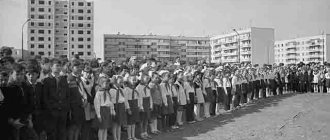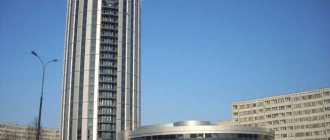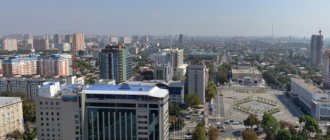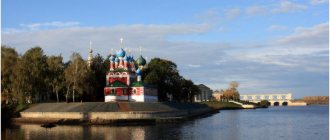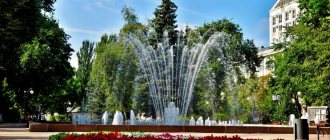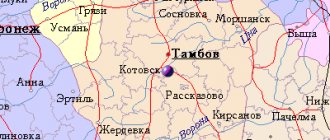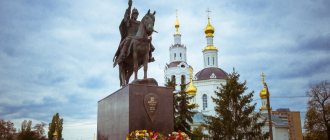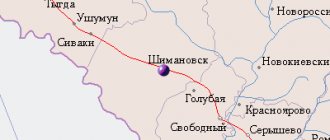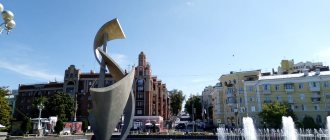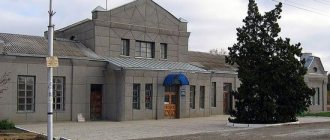Melenki
(Vladimir region)
OKATO code:
17242501
Founded:
beginning.
18th century City since:
1778 City of district subordination (Melenkovsky district, Vladimir region)
Center:
Melenkovsky district
Telephone code (reference phone)
| 49247***** | 22-2-22 |
Deviation from Moscow time, hours:
0
Geographic latitude:
55°20′
Geographic longitude:
41°38′
Altitude above sea level, meters:
130 Sunrise and sunset times in the city of Melenki
Story
Village Rogozhino
, located on the site of the current city, was part of the palace Unzhenskaya volost in the 18th century.
a new settlement volost
in documents from the early 18th century . This is also the name of the villages that were part of it and located along the Unzha River. Thus, the village was formed at the end of the 17th century, therefore it is absent in the scribe books of the Murom district, Unzhensk camp for the years 1627-29 and in the salary books of the Ryazan diocese for 1676. There are also no other villages of the Unzhenskaya volost there.
However, there is a legend that in 1463, settlers from Kostroma, devastated by the Tatars, founded the village of Priklon
of Melenki
emerged from it . This legend is not confirmed by any documentary evidence, although the existence of the Unzha River and the village of Melenki in the Kostroma region may speak in its favor.
Later the village of Rogozhino received the name Veretevo
, and in 1709 it began to be called a village due to the construction of a church in it and acquired the name
Melenki
[4]. The population of Melenki at that time was 30 households. In 1778, the palace village of Melenki, when the Vladimir province was divided into counties, received the status of a county town, and the peasants of the Main Palace Department who inhabited it were registered as burghers. Being a county town, Melenki was distinguished by its very small size; even at the beginning of the 19th century, there was only one church in the city - the three-parish Church of the Intercession, whose parishioners, moreover, were not only townspeople, but also peasants from the surrounding villages.
By January 1, 1896, the population was 6,843 (3,196 men and 3,647 women). Orthodox 6562, schismatics 136, Protestants 8, Catholics 22, Jews 53, other denominations 66. Nobles 86, clergy 15, honorary citizens and merchants 761, burghers 4842, peasants 1112, other classes 31. With the adjacent pasture, the city occupies 134 tithes. There were three churches in the city, all made of stone; Intercession Cathedral, built in 1709, has three altars: in honor of the Intercession of the Mother of God (main altar), Archangel Michael and Elijah the Prophet); a cemetery church, built in 1797, in which there is one altar in honor of All Saints, and the St. Nicholas non-parish church, built in 1871-1879, which has three altars: in honor of St. Nicholas the Wonderworker (main altar), Alexei Metropolitan and Simeon the Stylite[5]. City 3-grade and parish schools for men, parish schools for women and a parochial school. Almshouse, zemstvo hospital with 45 beds, factory hospital with 22 beds, pharmacy, private library, 1 printing house. 1 tannery - 600 rubles. production, 7 oil mills - 3942 rubles, 1 paper weaving factory, with 1065 workers - 1081230 rubles, 2 linen mills, with 1820 workers - 1541703 rubles, 1 bleaching plant - 52787 rubles, 1 iron smelter - 6450 rubles. The main occupation of the residents is the purchase, processing and marketing of flax. At the end of the 19th century, Melenki was the center of the entire county for flax trade[6].
During the years of Soviet power in Melenki, all the churches were first closed, and a little later, even before the war, they were destroyed. A monument to Lenin was erected on the site of the Intercession Cathedral, and a city park was built around it. On the site of the St. Nicholas Church, the Yunost [7] cinema was built, and cemetery burials were arranged on the site of the Church of All Saints. Only the bell tower from the Church of All Saints has survived, which was used as a fire tower during the years of Soviet power.
In 1997, the cinema building[8] was transferred to the ownership of the Russian Orthodox Church with the right to convert it into a religious institution. On October 14, 1997, St. Nicholas Church was consecrated by Archbishop of Vladimir and Suzdal Eulogius.
Melenki is a large Old Believer center in the Vladimir region. In 1729, the hierodeacon of the Vyaznikovsky Annunciation Monastery, Pachomius, fled to the Melenkovsky forests, where he founded a monastery. In the same forests, surrounded by Old Believer villages along the Unzha River, a convent appeared at the same time, headed by the nun Devora from the Naryshkin family. It was the Old Believers merchants F. Luknovsky and I. Rukavishnikov who opened a flax processing factory in 1733 on hired peasant land in Melenki. In 1999, the local Melenkovskaya Old Believer community was given the building of a kindergarten[9], one of the premises of which was converted into a temple. On March 28, the temple was consecrated by Metropolitan Alimpiy in the name of the Exaltation of the Honorable Cross. In 2008, with the assistance of the local city administration, a temple project was developed. A new stone church was built near the current one. On June 20, 2010, Metropolitan Cornelius performed the ceremony of founding the temple[10]..
Map
| Melenki: maps |
Melenki: photo from space (Google Maps) Melenki: photo from space (Microsoft Virtual Earth)
| Melenki. Nearest cities. Distances in km. on the map (in brackets along roads) + direction. Using the hyperlink in the distance , you can get the route (information courtesy of the AutoTransInfo website) | |||
| 1 | Doschatoe (Nizhny Novgorod region) | 30 () | IN |
| 2 | Vyksa | 34 (83) | IN |
| 3 | Moore | 36 (41) | NE |
| 4 | Navashino | 42 (57) | NE |
| 5 | Kasimov | 46 (49) | YU |
| 6 | Kulebaki | 56 (87) | IN |
| 7 | Red Gorbatka | 60 (113) | WITH |
| 8 | Kurlovo | 65 (151) | Z |
| 9 | Gus-Khrustalny | 69 (172) | NW |
| 10 | Tuma (Ryazan region) | 71 (111) | Z |
| 11 | Ermish (Ryazan region) | 75 (198) | SE |
| 12 | Sudogda | 83 (134) | NW |
| 13 | Pitelino (Ryazan region) | 84 (115) | YU |
| 14 | Voznesenskoye (Nizhny Novgorod region) | 86 (162) | SE |
| 15 | Gremyachevo (Nizhny Novgorod region) | 88 (124) | IN |
| 16 | Vacha (Nizhny Novgorod region) | 88 (99) | NE |
| 17 | Nikologory | 92 () | WITH |
| 18 | Ardatov (Nizhny Novgorod region) | 93 (150) | IN |
| 19 | Tengushevo (Republic of Mordovia) | 93 (180) | SE |
| 20 | Spas-Klepiki | 95 (136) | Z |
| 21 | Kadom (Ryazan region) | 101 (201) | SE |
| 22 | Melekhovo | 105 (179) | WITH |
| 23 | Vyazniki | 106 (156) | WITH |
| 24 | Diveevo (Nizhny Novgorod region) | 107 (180) | IN |
| 25 | Sosnovskoye (Nizhny Novgorod region) | 109 (145) | NE |
| 26 | Sasovo | 110 (139) | YU |
| 27 | Rainbow | 110 (190) | NW |
| 28 | Pavlovo | 113 (128) | NE |
| 29 | Tumbotino (Nizhny Novgorod region) | 114 (177) | NE |
| 30 | Sarov | 115 (194) | SE |
a brief description of
The city is located in the eastern part of the Meshchera Lowland, on the river. Unzha (tributary of the Oka), 22 km from the railway. Butylitsy station, 150 km southeast of Vladimir.
Territory (sq. km): 11
Information about the city of Melenki on the Russian Wikipedia site
Historical sketch
At the beginning of the 18th century. Melenki is a palace village. In 1709, the main temple was built, consecrated in honor of the Intercession of the Most Holy Theotokos.
Since 1778, the district town of the Vladimir governorship (since 1796 - Vladimir province). Name by location on the river. Melenka, which is obviously connected with the presence of a mill on this river.
In 1856, in the district town of Melenki, Vladimir province, there were 2 churches, 478 houses, 31 shops.
In the 1920s In Melenki there was an iron foundry and a flax spinning factory "Krasny Tekstilshchik" (now a flax mill).
Economy
Flax mill. Factories - foundry-mechanical and for the production of umbrellas. Food industry enterprises, production of building materials.
There is peat extraction in the area.
In the village of Korovino, artistic pottery is developed.
Culture, science, education
Melenki is the birthplace of N.P. Kamanin - Hero of the Soviet Union, participant in the expedition to mow down the crew of the steamship "Chelyuskin", Soviet literary scholar Academician P.I. Lebedev-Polyansky.
Architecture, sights
Near the city of Melenki, in the village of Korovino, artistic pottery is developed.
| Population by year (thousands of inhabitants) | |||||||
| 1856 | 4.6 | 1970 | 18.5 | 2005 | 15.9 | 2015 | 14.3 |
| 1897 | 8.9 | 1979 | 18.1 | 2006 | 15.7 | 2016 | 14.2 |
| 1913 | 10.3 | 1989 | 18.3 | 2007 | 15.5 | 2017 | 14.0 |
| 1923 | 8.7 | 1992 | 18.3 | 2008 | 15.3 | 2018 | 13.8 |
| 1926 | 10.6 | 1996 | 18.2 | 2010 | 15.1 | 2019 | 13.6 |
| 1931 | 11.8 | 1998 | 17.9 | 2011 | 15.2 | 2020 | 13.5 |
| 1939 | 15.6 | 2000 | 17.6 | 2012 | 14.9 | 2021 | 13.3 |
| 1959 | 17.5 | 2001 | 17.5 | 2013 | 14.7 | ||
| 1967 | 18 | 2003 | 16.3 | 2014 | 14.5 | ||
Links[edit]
Notes[edit]
- ^ abcd Resolution No. 433
- ^ a b Federal State Statistics Service (2011). “All-Russian Population Census 2010. Volume 1" [All-Russian Population Census 2010, vol. 1]. All-Russian Population Census 2010 [All-Russian Population Census 2010]
. Federal State Statistics Service. - "26. The size of the permanent population of the Russian Federation by municipalities as of January 1, 2022". Federal State Statistics Service. Retrieved January 23, 2022.
- ^ ab State Committee of the Russian Federation on Statistics. Committee of the Russian Federation for Standardization, Metrology and Certification. No. OK 019-95 January 1, 1997 “All-Russian classifier of objects of administrative-territorial division. Code 17 242", ed. changes No. 278 / 2015 dated January 1, 2016. (Goskomstat of the Russian Federation. Committee of the Russian Federation for Standardization, Metrology and Certification. No. OK 019-95 January 1, 1997. Russian classification of administrative divisions) (OKATO).
Code 17 242 , as amended by Amendment No. 278/2015 of 01/01/2016). - ^ abcde Law No. 57-OZ
- "On the Calculation of Time". Official Internet portal of legal information
. June 3, 2011. Retrieved January 19, 2022. - Post office. Information and computing center of OASU RPO. ( Post office
).
Search for postal service objects ( postal Search for objects
) (in Russian) - ↑
Federal State Statistics Service of Russia (May 21, 2004).
“The population of Russia, the constituent entities of the Russian Federation as part of federal districts, urban settlements, settlements, settlements of 3 thousand or more people” [Population of Russia, its federal districts, federal districts, districts, urban settlements, rural settlements - administrative centers and rural settlements with a population of more than 3000] (XLS). All-Russian Population Census of 2002 [All-Russian Population Census of 2002]
. - “All-Union Population Census of 1989. The current population of union and autonomous republics, autonomous regions and districts, territories, negative phenomena, urban settlements and rural district centers” [All-Union Population Census of 1989: current population of union and autonomous republics, Autonomous regions and districts , territories, regions, districts, urban settlements, villages performing the functions of district administrative centers. All-Union Population Census of 1989 [All-Union Population Census of 1989]
.
Institute of Demography of the National Research University: Higher School of Economics [Institute of Demography of the National Research University: Higher School of Economics]. 1989 - via Demoscope Weekly
.
Excerpt characterizing Melenki
Tikhon knew the prince’s habit of sometimes expressing his thoughts out loud, and therefore, with an unchanged face, he met the questioningly angry look of the face that appeared from under his shirt. - Have you gone to bed? - asked the prince. Tikhon, like all good lackeys, knew by instinct the direction of the master’s thoughts. He guessed that they were asking about Prince Vasily and his son. “We deigned to lie down and put out the fire, your Excellency.” “No reason, no reason...” the prince said quickly and, putting his feet into his shoes and his hands into his robe, went to the sofa on which he was sleeping. Despite the fact that nothing was said between Anatole and m lle Bourienne, they completely understood each other regarding the first part of the novel, before the appearance of pauvre mere, they realized that they had a lot to say to each other secretly, and therefore in the morning they looked for an opportunity see you alone. While the princess went to her father at the usual hour, m lle Bourienne met with Anatole in the winter garden. Princess Marya approached the office door that day with special trepidation. It seemed to her that not only did everyone know that her fate would be decided today, but that they also knew what she thought about it. She read this expression in Tikhon’s face and in the face of Prince Vasily’s valet, who met the hot water in the corridor and bowed deeply to her. The old prince that morning was extremely affectionate and diligent in his treatment of his daughter. Princess Marya knew this expression of diligence well. This was the expression that happened on his face in those moments when his dry hands clenched into a fist out of frustration because Princess Marya did not understand the arithmetic problem, and he, getting up, walked away from her and repeated the same words several times in a quiet voice. the same words. He immediately got down to business and started the conversation by saying “you.” “They made me a proposition about you,” he said, smiling unnaturally. “I think you guessed,” he continued, “that Prince Vasily came here and brought with him his pupil (for some reason Prince Nikolai Andreich called Anatoly his pupil) not for my beautiful eyes.” Yesterday they made a proposition about you. And since you know my rules, I treated you. – How should I understand you, mon pere? - said the princess, turning pale and blushing. - How to understand! – the father shouted angrily. “Prince Vasily finds you to his liking for his daughter-in-law and makes a proposal to you for his pupil. Here's how to understand it. How to understand?!... And I’m asking you. “I don’t know how you are, mon pere,” the princess said in a whisper. - I? I? what am I doing? Leave me aside. I'm not the one getting married. What do you? This is what it would be good to know. The princess saw that her father looked at this matter unkindly, but at that very moment the thought came to her that now or never the fate of her life would be decided. She lowered her eyes so as not to see the gaze, under the influence of which she felt that she could not think, but could only obey out of habit, and said: “I wish only one thing - to fulfill your will,” she said, “but if my desire it was necessary to express... She did not have time to finish. The prince interrupted her. “And wonderful,” he shouted. - He will take you with a dowry, and by the way, he will capture m lle Bourienne. She will be a wife, and you... The prince stopped. He noticed the impression these words made on his daughter. She lowered her head and was about to cry. “Well, well, just kidding, just kidding,” he said. “Remember one thing, princess: I adhere to the rules that a girl has every right to choose.” And I give you freedom. Remember one thing: the happiness of your life depends on your decision. There's nothing to say about me. - Yes, I don’t know... mon pere. - Nothing to say! They tell him, he doesn’t just marry you, whoever you want; and you are free to choose... Go to your room, think it over and in an hour come to me and say in front of him: yes or no. I know you will pray. Well, maybe pray. Just think better. Go. Yes or no, yes or no, yes or no! - he shouted even as the princess, as if in a fog, staggered out of the office. Her fate was decided and decided happily. But what my father said about m lle Bourienne - this hint was terrible. It’s not true, let’s face it, but it was still terrible, she couldn’t help but think about it. She walked straight ahead through the winter garden, seeing and hearing nothing, when suddenly the familiar whisper of M lle Bourienne woke her up. She raised her eyes and, two steps away, saw Anatole, who was hugging the Frenchwoman and whispering something to her. Anatole, with a terrible expression on his beautiful face, looked back at Princess Marya and did not release the waist of m lle Bourienne, who did not see her, at the first second. "Who is here? For what? Wait!" Anatole’s face seemed to speak. Princess Marya looked at them silently. She couldn't understand it. Finally, M lle Bourienne screamed and ran away, and Anatole bowed to Princess Marya with a cheerful smile, as if inviting her to laugh at this strange incident, and, shrugging his shoulders, walked through the door leading to his half. An hour later Tikhon came to call Princess Marya. He called her to the prince and added that Prince Vasily Sergeich was there. The princess, when Tikhon arrived, was sitting on the sofa in her room and holding the crying Mlla Bourienne in her arms. Princess Marya quietly stroked her head. The beautiful eyes of the princess, with all their former calm and radiance, looked with tender love and regret at the pretty face of m lle Bourienne. “Non, princesse, je suis perdue pour toujours dans votre coeur, [No, princess, I have forever lost your favor,” said m lle Bourienne. – Pourquoi? “Je vous aime plus, que jamais,” said Princess Marya, “et je tacherai de faire tout ce qui est en mon pouvoir pour votre bonheur.” [Why? I love you more than ever, and I will try to do everything in my power for your happiness.] – Mais vous me meprisez, vous si pure, vous ne comprendrez jamais cet egarement de la passion. Ah, ce n'est que ma pauvre mere... [But you are so pure, you despise me; you will never understand this fascination of passion. Ah, my poor mother...] “Je comprends tout, [I understand everything,” answered Princess Marya, smiling sadly. - Calm down, my friend. “I’ll go to my father,” she said and left. Prince Vasily, bending his leg high, with a snuffbox in his hands and as if extremely emotional, as if he himself was regretting and laughing at his sensitivity, sat with a smile of tenderness on his face when Princess Marya entered. He hurriedly brought a pinch of tobacco to his nose. “Ah, ma bonne, ma bonne, [Ah, darling, darling.],” he said, standing up and taking her by both hands. He sighed and added: “Le sort de mon fils est en vos mains.” Decidez, ma bonne, ma chere, ma douee Marieie qui j'ai toujours aimee, comme ma fille. [The fate of my son is in your hands. Decide, my dear, my dear, my gentle Marie, whom I have always loved like a daughter.] He walked away. A real tear appeared in his eyes. “Fr... fr...” Prince Nikolai Andreich snorted. - The prince, on behalf of his pupil... son, makes a proposition to you. Do you want or not to be the wife of Prince Anatoly Kuragin? You say yes or no! - he shouted, - and then I reserve the right to say my opinion. Yes, my opinion and only my opinion,” added Prince Nikolai Andreich, turning to Prince Vasily and responding to his pleading expression. - Yes or no? – My desire, mon pere, is never to leave you, never to separate my life from yours. “I don’t want to get married,” she said decisively, looking with her beautiful eyes at Prince Vasily and her father. - Nonsense, nonsense! Nonsense, nonsense, nonsense! - Prince Nikolai Andreich shouted, frowning, took his daughter by the hand, bent her to him and did not kiss her, but only bending his forehead to her forehead, touched her and squeezed the hand he was holding so much that she winced and screamed. Prince Vasily stood up. – Ma chere, je vous dirai, que c'est un moment que je n'oublrai jamais, jamais; mais, ma bonne, est ce que vous ne nous donnerez pas un peu d'esperance de toucher ce coeur si bon, si genereux. Dites, que peut etre... L'avenir est si grand. Dites: peut etre. [My dear, I will tell you that I will never forget this moment, but, my dearest, give us at least a small hope of being able to touch this heart, so kind and generous. Say: maybe... The future is so great. Say: maybe.] - Prince, what I said is everything that is in my heart. I thank you for the honor, but I will never be your son's wife. - Well, it’s over, my dear. Very glad to see you, very glad to see you. Come to yourself, princess, come,” said the old prince. “I’m very, very glad to see you,” he repeated, hugging Prince Vasily. “My calling is different,” Princess Marya thought to herself, my calling is to be happy with another happiness, the happiness of love and self-sacrifice. And no matter what it costs me, I will make poor Ame happy. She loves him so passionately. She repents so passionately. I will do everything to arrange her marriage with him. If he is not rich, I will give her money, I will ask my father, I will ask Andrey. I will be so happy when she becomes his wife. She is so unhappy, a stranger, lonely, without help! And my God, how passionately she loves, if she could forget herself like that. Maybe I would have done the same!...” thought Princess Marya. For a long time the Rostovs had no news about Nikolushka; Only in the middle of winter was a letter given to the count, at the address of which he recognized his son’s hand. Having received the letter, the count, frightened and hasty, trying not to be noticed, ran on tiptoe into his office, locked himself and began to read. Anna Mikhailovna, having learned (as she knew everything that was happening in the house) about the receipt of the letter, quietly walked into the count’s room and found him with the letter in his hands, sobbing and laughing together. Anna Mikhailovna, despite the improvement in her affairs, continued to live with the Rostovs. - Mon bon ami? – Anna Mikhailovna said inquiringly, sadly and with a readiness for any kind of participation. The Count began to cry even more. “Nikolushka... letter... wounded... would... be... ma сhere... wounded... my darling... countess... promoted to officer... thank God... How can I say countess?...” Anna Mikhailovna sat down next to him, wiped away the tears from his eyes and from the letter with her handkerchief , dripped by them, and her own tears, read the letter, calmed the count and decided that before lunch and before tea she would prepare the countess, and after tea she would announce everything, if God helped her. Throughout dinner, Anna Mikhailovna talked about rumors of war, about Nikolushka; I asked twice when the last letter from him was received, although I knew this before, and noticed that it would be very easy, perhaps, to receive a letter today. Every time at these hints the countess began to worry and look anxiously, first at the count, then at Anna Mikhailovna, Anna Mikhailovna most imperceptibly reduced the conversation to insignificant subjects. Natasha, of the whole family, most gifted with the ability to sense shades of intonation, glances and facial expressions, from the beginning of dinner her ears pricked up and knew that there was something between her father and Anna Mikhailovna and something concerning her brother, and that Anna Mikhailovna was preparing. Despite all her courage (Natasha knew how sensitive her mother was to everything related to the news about Nikolushka), she did not dare to ask questions at dinner and, out of anxiety, ate nothing at dinner and spun around in her chair, not listening to her governess’s comments. After lunch, she rushed headlong to catch up with Anna Mikhailovna and in the sofa room, with a running start, threw herself on her neck. - Auntie, my dear, tell me, what is it?
Famous people associated with the city
- Kamanin, Nikolai Petrovich - pilot, one of the first Heroes of the Soviet Union (1934), colonel general, participant in the expedition to rescue the crew and passengers of the Chelyuskin steamship, participant in the Soviet-Finnish and Great Patriotic Wars, participant in the Victory Parade on Red Square (1945 ), the first head of the training of Soviet cosmonauts. Born in Melenki.
- Koznov, Boris Ilyich - military leader, major general, participant in the Soviet-Finnish and Great Patriotic Wars. Hero of the Soviet Union (1945).
- Lebedev-Polyansky, Pavel Ivanovich - literary scholar and critic.
- Hieromartyr Seraphim (Zvezdinsky), bishop of the Russian Orthodox Church. He lived in the city from 1927 to 1932 before his arrest.
- Rozanova, Olga Vladimirovna (1886-1918) - avant-garde artist who worked in the style of Suprematism, Neo-Primitivism and Cubo-Futurism. Born in Melenki on June 21, 1886.
- Yakunin, Vladimir Ivanovich - President of JSC Russian Railways, one of the world's largest transport companies, was born in Melenki in 1948.
- Ovsyankin, Sergey Anatolyevich - weightlifter, silver medalist of the European Kettlebell Lifting Championship, record holder of the Guinness Book of Records (born June 14, 1959 in Melenki)[31].
